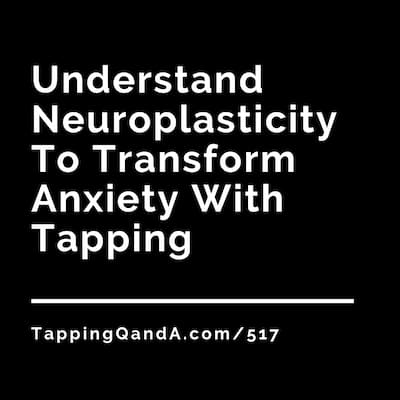 I am completely fascinated by the concept of neuroplasticity.
I am completely fascinated by the concept of neuroplasticity.
Neuroplasticity is a term that refers to the ability of our brains to adapt to our environment and change with experience. That means that the brain's neurological pathways aren't set in stone, but are flexible and can be reshaped.
One one level we already understand this. We know that we can stop old habits (like smoking) and create new ones (like tapping).
At the same time, it wasn't until the 1960s that there was scientific proof that we could actually change our brains.
I find this really exciting for two reasons.
First, it means that we aren't stuck! We can change the way we see ourselves, see the world and, most importantly, change the way we feel.
Second, it makes me want to tap even more because it means I'm not just changing how I feel in the moment, it's also possible to make change at a neurological level that is lasting.
In this week's podcast my friend Dr. Kim D'Eramo and I discuss the relationship between neuroplasticity and the process of transforming anxiety and depression.
Kim gives a number of straightforward approaches that we can use with tapping to transform anxiety and depression in a way that isn't just about feeling better now, but will create long-term change.
Dr. Kim has also created an amazing 4-week program to help with chronic anxiety which you can read about here. (aff)
Supporters of the podcast have access to a bonus interview with Dr. Kim. Become a supporter today to have access to this and all the bonus podcasts.
Subscribe in: Apple | Android | Spotify
Guest: Dr. Kim D'Eramo
Contact: web @ DrKimDeramo.com; instagram @drkimderamo; youtube @YouAttractWellness; facebook @DrKimDeramo
About: Dr Kim D'Eramo graduated medical school in 2002 from University of New England College of Osteopathic Medicine, where she also completed a Fellowship in Osteopathic Medicine and Medical Gross Anatomy, as well as an undergraduate Fellowship in Neuroanatomy. She completed her Emergency Medicine residency at Emory University in 2005, and is board certified in Emergency Medicine.
Dr. Kim founded The American Institute of Mind Body Medicine (AIMBM) to train other doctors and health practitioners how to activate the body's ability to heal itself. Through AIMBM, she conducts live workshops and retreats, and assists clients online internationally.
Dr. Kim and her husband Dr. Mario Torres-Leon produced a Top-10 podcast “The Thrive Doctors” featuring the latest in MindBody healing.
In 2012 she published The MindBody Toolkit, which was a #1 Amazon Bestseller, and her work has also been featured on national television networks in America.
Gene,
A lot of key observations and practices to unpack and utilize in this conversation. Will keep in my ‘listen again’ file. So much here that I resonated with. Love there’s always a gift, a learning, a supportive opportunity of some kind even if in the present moment it doesn’t feel like it. One of my favorite words in addition to ‘possibility’ or ‘possible’ is the word ‘wonder’.
I wonder what’s available here for me that’s helpful that I don’t see or feel right now? And I wonder what it will be like to allow myself to be available to receive it?
Any wonder question automatically creates space for something new, an unseen ‘possibility’ to peek its head through the open door to say ‘Hi’.
Another thing I found so very important that was mentioned in this podcast, is to acknowledge what IS. Really take the time to hold it. This is one thing about the life process of engagement via the modality called ‘Focusing’ that I find so much value in. The living, cellular intelligence of the body knows if you are just giving a cursory acknowledgment to something unpleasant with the conscious (or not so conscious) agenda of shifting it and making it ‘better’. Keeping something that’s disturbed, fearful, anxious, enraged or depressed company with ‘acceptance’ and ‘interested curiosity’ takes time. It’s something that cannot be rushed. How we ‘hold it’, ‘cradle’ it, is of utmost importance. It builds relationship. When relationship is cultivated then the something that is initially experienced and identified as disturbed, fearful, anxious, enraged or depressed is usually willing to open up to share more of what is going on for it. Because our ‘presence’ has allowed and cultivated this space, we are in a position to support the healing and new possibility that wants to come forward and live to do so with our tapping. Sometimes, efficiency can short circuit depth in our rush to get somewhere. Focusing is a process of engagement in how we pay attention and create relationship to anything which reveals itself, and to do so in a way that allows and facilitates life forward movement to unfold. EFT is a beautiful dance partner that enhances the intention and outcomes of both modalities for opening one’s life to new possibilities.
I almost always utilize the benefit of focusing skills with EFT when working with myself or others. I also like to incorporate Byron Katie’s work as the 5 questions can really help to shift and clarify patterns of beliefs which are limiting and also allow new possibilities to emerge.
All the best, and thank you for your compassionate and dedicated offerings that help to build a stronger, healthier, and more loving global community.